
Reading comprehension -TOEFL- Lesson 25 (Đ c hi u -TOEFL- Bài 25)ọ ể
Đ c đo n văn sau và tr l i các câu h i:ọ ạ ả ờ ỏ
A team of Russian scientists has challenged the theory that the woolly mammoths
became extinct 10,000 years ago at the end of the Ice Age. The scientists have
reported that the beasts may have survived until 2000 B.C. on an island off the
coast of Siberia, where researchers 5 uncovered 29 fossilized woolly mammoth
teeth ranging in age from 4,000 to 7,000 years. The question to be asked now is,
how did these prehistoric pachyderms survive in their island environment? One
possibility is that they adapted to their confined surroundings by decreasing their
bulk. This theory is based on their smaller tooth size, which 10 has led scientists to
believe that they were only 6 feet tall at the shoulder compared with 10 feet of their
full-sized counterpart. But would this be enough to enable them to survive
thousands of years beyond that of other mammoths? Researchers are still working
to uncover the reasons for this isolated group's belated disappearance.
1. With which topic is this passage mainly concerned?
(A) Some scientists have challenged a theory.
(B) Some small teeth have been discovered.
(C) Some mammoths lived longer than others.
(D) Some pachyderms survived on an island.
2. According to the passage, some researchers suggest that mammoths became
extinct
(A) about 2,000 years ago
(B) about 4,000 years ago
(C) about 7,000 years ago
(D) about 10,000 years ago

3. The word "woolly" as used in line 1 refers to the animal's
(A) body size
(B) feet size
(C) hair
(D) teeth
4. The word "uncovered" as used in line 5 is closest in meaning to which of the
following?
(A) unearthed
(B) unburdened
(C) undisturbed
(D) unfolded
5. The word "adapted" in line 8 could best be replaced with
(A) lept
(B) penetrated
(C) revealed
(D) accommodated
6. In line 8, the word "confined" could best be replaced by
(A) imprisoned
(B) swampy
(C) restricted
(D) fenced
7. The author uses the word "counterpart" in line 11 to refer to
(A) mammoths with more feet
(B) mammoths in an earlier time
(C) mammoths with smaller teeth
(D) larger mammoths on the island
8. The word "enable" in line 12 could best be replaced by which of the

following?
(A) authorize
(B) enjoin
(C) undertake
(D) allow
9. The word "belated" in line 14 is closest in meaning to which of the
following?
(A) delayed
(B) early
(C) sudden
(D) gradual
10. According to the scientists, the woolly mammoths may have managed to
survive because they
(A) shed their hair
(B) grew smaller teeth
(C) became herbivores
(D) decreased in size
11. According to the passage, the reason for the disappearance of the
mammoths on the island is
(A) that the temperature changed
(B) is not yet known
(C) that they were isolated
(D) that larger mammoths killed them
12. Which of the following terms from the passage is NOT used to refer to the
mammoths?
(A) beasts
(B) pachyderms

(C) bulk
(D) group

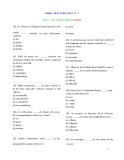
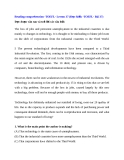
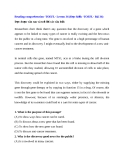
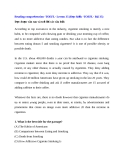
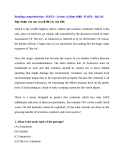
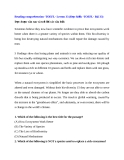
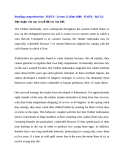
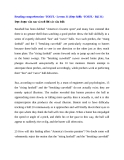
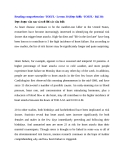
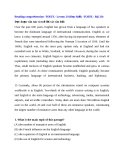


![Tài liệu luyện thi TOEIC cấp tốc trong 10 ngày [chuẩn nhất]](https://cdn.tailieu.vn/images/document/thumbnail/2025/20251029/kimphuong1001/135x160/99661761725822.jpg)
![Tài liệu Phá đảo TOEIC 900+ từ mất gốc trong 30 ngày [Mới nhất]](https://cdn.tailieu.vn/images/document/thumbnail/2025/20251029/kimphuong1001/135x160/2101761720956.jpg)











